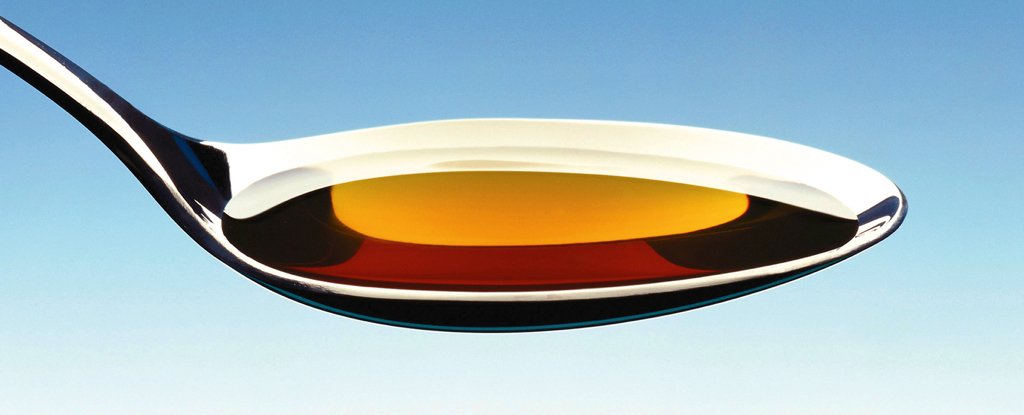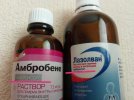This caught my eye because it's not the first time ambroxol appears to be quite the ideal medicine to detox cells.

 www.sciencealert.com
www.sciencealert.com
PETER DOCKRILL
17 FEB 2020
A drug first discovered over 50 years ago and long used as a medicine for coughs and respiratory illnesses appears to show promise in treating a very different kind of sickness: Parkinson's disease.
Ambroxol, an active ingredient in cough mixtures since the 1970s, has been investigated in recent years for its apparent potential to halt the progression of Parkinson's, and already this year, the drug has passed two important milestones that may bring us closer to a much-hoped-for treatment.
Last month, a multi-institutional team of researchers led by University College London (UCL) reported the results of a small Phase II clinical trial suggesting that ambroxol was safe and well-tolerated in human patients with Parkinson's disease, while hinting at possible neuroprotective effects that need to be examined further in subsequent trials.
Based on these outcomes, last week funding was announced to continue the next steps in evaluating ambroxol in a much larger cohort of people with Parkinson's, while also seeking to learn more about how individual patient genotypes may contribute to the disease.
"The ambroxol study is important because there are no treatments available for Parkinson's that slow, stop, or reverse [it]" says Simon Stott, deputy director of research at The Cure Parkinson's Trust, one of the bodies funding the research program.
"All of the current medications only deal with the symptoms of the condition – they do nothing to delay the progression of Parkinson's."
In the latest open-label trial, 17 patients with the disease were monitored while taking a daily dose of ambroxol over a six-month period.
In addition to checking that the therapy was safe at the dosage administered, the researchers also wanted to see whether ambroxol would cross the blood-brain barrier, and how the therapy might play out differently between patients either with or without particular mutations in a gene called GBA1 (the glucocerebrosidase gene).
Such GBA1 mutations are considered the most important genetic risk factor for Parkinson's, with the gene variant predisposing people to a greater risk of developing the disease at a younger age, and with a more rapid onset of symptoms.
Scientists think this happens because the mutation inhibits the natural release of glucocerebrosidase proteins (called GCase), which perform a clean-up process in the brain, preventing the harmful build-up of another kind of protein called alpha-synuclein, viewed as a key culprit in the cognitive dysfunction we see in Parkinson's case.
"By increasing levels of GCase, ambroxol allows cells to remove waste, which would ideally keep cells healthier for longer and could slow down the progression of Parkinson's," says lead researcher and neurologist Tony Schapira from UCL.
Previous experiments with human cells and animal models suggests ambroxol can help increase GCase proteins while reducing alpha-synuclein levels, which is why the venerable cough syrup drug carries much hope as a potential treatment for Parkinson's disease.
We're not quite there yet, as the results from this new trial will need to be replicated in much larger tests, but the signs, the researchers say, are promising so far.
"This study provides us with the 'proof of concept' that we can raise levels of GCase in humans with ambroxol, and that the drug is safe and well tolerated in people with Parkinson's," says Stott.
"If further study shows ambroxol can improve the health and function of cells, it may result in slower disease progression for people with Parkinson's."
In the study, the experiment showed the drug successfully penetrated the blood-brain barrier, and increased GCase protein levels in participants' cerebrospinal fluid by about 35 percent, while being safe and well-tolerated by the patients taking the therapy, with no adverse effects reported.
The researchers did not find a difference between the responses of patients who do have the GBA1 mutation, and those who do not - another aspect of their results that will require further investigation.
Additionally, assessments of the patients' capacity for physical movement on the Movement Disorder Society Unified Parkinson Disease Rating Scale (MDS-UPDRS) saw the participants' movement scores slightly improve by a number of points on average, suggesting that the drug might have positive effects on motor control in Parkinson's disease patients.
That's a big 'might' though, as the researchers emphasise testing MDS-UPDRS scores was only one of many secondary outcomes in this small trial, which did not involve placebos being given to a control group.
Because of such limitations, the team says further testing is needed before drawing firmer conclusions about the effects of the drug on movement and other Parkinson's symptoms.
"However, the changes support the clinical impression that no substantial deleterious effect of ambroxol was observed among participants taking ambroxol, including any adverse effect on the motor features of their Parkinson's disease," the authors note.
With the newly announced funding to support the next stage of research into ambroxol, it will assist the drug to move forward into phase III trials. The first step, to be led by Schapira, will be to determine the optimal dose of the drug.
The findings are reported in JAMA Neurology, and you can find out more about the ambroxol trials here and here.
Editor's note (19 Feb 2020): A previous version of this article contained some erroneous information about the next stages of research; this has since been amended.

A Common Cough Syrup Drug Just Passed Another Trial as Parkinson's Treatment
A drug first discovered over 50 years ago and long used as a medicine for coughs and respiratory illnesses appears to show promise in treating a very different kind of sickness: Parkinson's disease.
PETER DOCKRILL
17 FEB 2020
A drug first discovered over 50 years ago and long used as a medicine for coughs and respiratory illnesses appears to show promise in treating a very different kind of sickness: Parkinson's disease.
Ambroxol, an active ingredient in cough mixtures since the 1970s, has been investigated in recent years for its apparent potential to halt the progression of Parkinson's, and already this year, the drug has passed two important milestones that may bring us closer to a much-hoped-for treatment.
Last month, a multi-institutional team of researchers led by University College London (UCL) reported the results of a small Phase II clinical trial suggesting that ambroxol was safe and well-tolerated in human patients with Parkinson's disease, while hinting at possible neuroprotective effects that need to be examined further in subsequent trials.
Based on these outcomes, last week funding was announced to continue the next steps in evaluating ambroxol in a much larger cohort of people with Parkinson's, while also seeking to learn more about how individual patient genotypes may contribute to the disease.
"The ambroxol study is important because there are no treatments available for Parkinson's that slow, stop, or reverse [it]" says Simon Stott, deputy director of research at The Cure Parkinson's Trust, one of the bodies funding the research program.
"All of the current medications only deal with the symptoms of the condition – they do nothing to delay the progression of Parkinson's."
In the latest open-label trial, 17 patients with the disease were monitored while taking a daily dose of ambroxol over a six-month period.
In addition to checking that the therapy was safe at the dosage administered, the researchers also wanted to see whether ambroxol would cross the blood-brain barrier, and how the therapy might play out differently between patients either with or without particular mutations in a gene called GBA1 (the glucocerebrosidase gene).
Such GBA1 mutations are considered the most important genetic risk factor for Parkinson's, with the gene variant predisposing people to a greater risk of developing the disease at a younger age, and with a more rapid onset of symptoms.
Scientists think this happens because the mutation inhibits the natural release of glucocerebrosidase proteins (called GCase), which perform a clean-up process in the brain, preventing the harmful build-up of another kind of protein called alpha-synuclein, viewed as a key culprit in the cognitive dysfunction we see in Parkinson's case.
"By increasing levels of GCase, ambroxol allows cells to remove waste, which would ideally keep cells healthier for longer and could slow down the progression of Parkinson's," says lead researcher and neurologist Tony Schapira from UCL.
Previous experiments with human cells and animal models suggests ambroxol can help increase GCase proteins while reducing alpha-synuclein levels, which is why the venerable cough syrup drug carries much hope as a potential treatment for Parkinson's disease.
We're not quite there yet, as the results from this new trial will need to be replicated in much larger tests, but the signs, the researchers say, are promising so far.
"This study provides us with the 'proof of concept' that we can raise levels of GCase in humans with ambroxol, and that the drug is safe and well tolerated in people with Parkinson's," says Stott.
"If further study shows ambroxol can improve the health and function of cells, it may result in slower disease progression for people with Parkinson's."
In the study, the experiment showed the drug successfully penetrated the blood-brain barrier, and increased GCase protein levels in participants' cerebrospinal fluid by about 35 percent, while being safe and well-tolerated by the patients taking the therapy, with no adverse effects reported.
The researchers did not find a difference between the responses of patients who do have the GBA1 mutation, and those who do not - another aspect of their results that will require further investigation.
Additionally, assessments of the patients' capacity for physical movement on the Movement Disorder Society Unified Parkinson Disease Rating Scale (MDS-UPDRS) saw the participants' movement scores slightly improve by a number of points on average, suggesting that the drug might have positive effects on motor control in Parkinson's disease patients.
That's a big 'might' though, as the researchers emphasise testing MDS-UPDRS scores was only one of many secondary outcomes in this small trial, which did not involve placebos being given to a control group.
Because of such limitations, the team says further testing is needed before drawing firmer conclusions about the effects of the drug on movement and other Parkinson's symptoms.
"However, the changes support the clinical impression that no substantial deleterious effect of ambroxol was observed among participants taking ambroxol, including any adverse effect on the motor features of their Parkinson's disease," the authors note.
With the newly announced funding to support the next stage of research into ambroxol, it will assist the drug to move forward into phase III trials. The first step, to be led by Schapira, will be to determine the optimal dose of the drug.
The findings are reported in JAMA Neurology, and you can find out more about the ambroxol trials here and here.
Editor's note (19 Feb 2020): A previous version of this article contained some erroneous information about the next stages of research; this has since been amended.

 I'm aiming to leave and move overseas within the next couple of years. At least in Europe if you can afford it you can buy it. Here, your life can depend on it and you can only get a shitty replacement which is costly and doesn't do the job.
I'm aiming to leave and move overseas within the next couple of years. At least in Europe if you can afford it you can buy it. Here, your life can depend on it and you can only get a shitty replacement which is costly and doesn't do the job.

